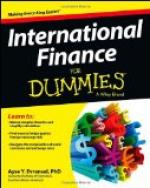In Egypt international finance had lent money to a potentate ruling an economically backward people, without taking much trouble to consider how the money was to be spent, or whether the country could stand the charge on its revenues that the loans would involve. The fact that it did so was from one point of view a blunder and from another a crime, but this habit of committing blunders and crimes, which is sometimes indulged in by finance as by all other forms of human activity, will have to be dealt with in our next chapter, when we deal with the evils of international finance. The consequence of this blunder was that Egypt went into default, and England’s might was used on behalf of the bondholders who had made a bad investment. This fact has been put forward by Mr. Brailsford, in his very interesting book on “The War of Steel and Gold,” and by other writers, to show that our diplomacy is the tool of international finance, and that the forces created by British taxpayers for the defence of their country’s honour, are used for the sordid purpose of wringing interest for a set of money-grubbers in the City, out of a poor and down-trodden peasantry overburdened by the exactions and extortions of their rulers. Mr. Brailsford, of course, puts his case much better than I can, in any brief summary of his views. He has earned and won the highest respect by his power as a brilliant writer, and by his disinterested and consistent championship of the cause of honesty and justice, wherever and whenever he thinks it to be in danger. Nevertheless, in this matter of the Egyptian war I venture to think that he is mistaking the tail for the dog. Diplomacy, I fancy, was not wagged by finance, but used finance as a very opportune pretext. If Egypt had been Brazil, it is not very likely that the British fleet would have shelled Rio de Janeiro. The bondholders would have been reminded of the sound doctrine, caveat emptor, which signifies that those who make a bad bargain have only themselves to blame, and must pocket their loss with the best grace that they can muster. As it was, Egypt had long ago been marked out as a place that England wanted, because of its vitally important position on the way to India. Kinglake, the historian, writing some three-quarters of a century ago, long before the Suez Canal was built, prophesied that Egypt would some day be ours. In Chapter XX. of “Eothen,” comes this well known passage on the Sphynx (he spelt it thus):—




